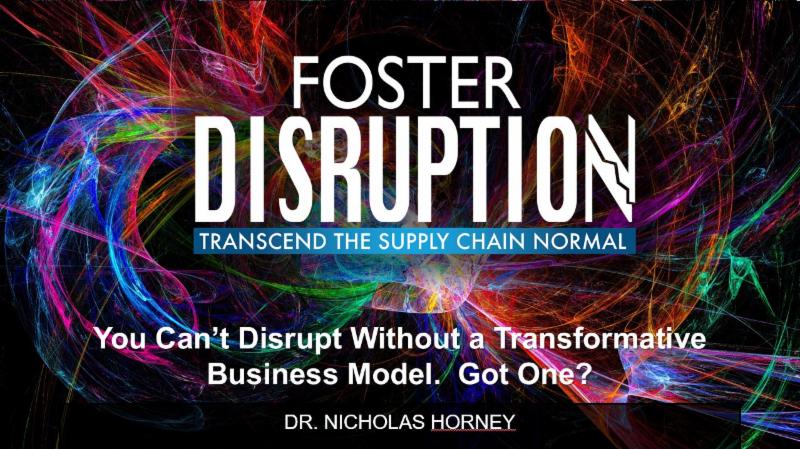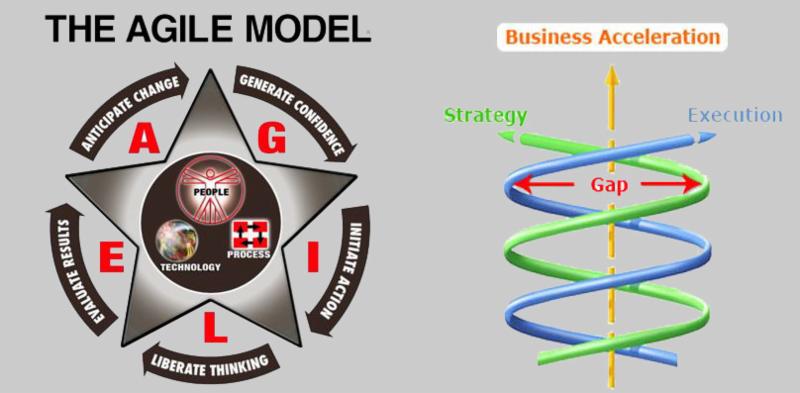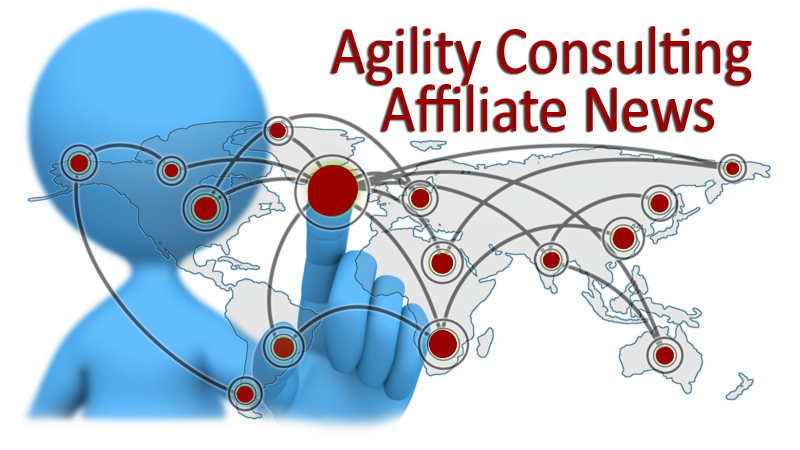| |
by Nick Horney, Ph.D., Leadership Agility Practice Leader
 Agility Transformation
is a business imperative to build and sustain an organization's capability to be preemptive and capture competitive advantage while responding to the accelerating pace of disruption in the marketplace. I recently delivered a presentation on the topic of Agility Transformation to a global conference of Supply Chain professionals. As with other professional groups, business as usual is increasingly disrupted by VUCA (volatility, uncertainty, complexity and ambiguity) in the business environment. This is as true for Supply Chain professionals as it is Marketing, Sales, Human Resources, Engineering and other professional groups. Agility Transformation
is a business imperative to build and sustain an organization's capability to be preemptive and capture competitive advantage while responding to the accelerating pace of disruption in the marketplace. I recently delivered a presentation on the topic of Agility Transformation to a global conference of Supply Chain professionals. As with other professional groups, business as usual is increasingly disrupted by VUCA (volatility, uncertainty, complexity and ambiguity) in the business environment. This is as true for Supply Chain professionals as it is Marketing, Sales, Human Resources, Engineering and other professional groups.
Who are VUCA Masters?

The 5 Characteristics of VUCA Masters™ is the result of serving 23 years as a Navy Special Operations Officer combined with my research as a psychologist studying the agility characteristics of high-performing leaders, teams and organizations.
This research and experience resulted in
The Agile Model®
which is illustrated here:
|
By Ben Baran,
Ph.D., Agility Analytics Practice Leader

Some people, it seems, just "get it" better and faster than other people.
They understand how what other people do influences their options, they consider what incentives are at work in complex situations, and they think through the possible consequences-intended or unintended-of numerous scenarios.
They think critically. They challenge assumptions, including their own. They do all of these types of thinking, which roughly fall under the umbrella of "strategic thinking."
These strategic thinkers, we hope, are among those leading our organizations.
We hope that leaders think strategically because our world is continually changing. Many argue that the pace of change continues to accelerate, and increasingly rapid technological innovation combined with globalization suggest that this is the case.
We need leaders who think strategically because the success of their organizations in the long term depends upon it.
Therefore, many are investing in developing the capacity for strategic thinking within their organizations.
They wonder, with good reason, whether people can actually learn strategic thinking. Because if people can learn it, we might be able to teach it. If we can teach it or otherwise reliably encourage its use, our organizations should benefit.
But first, what is strategic thinking? Numerous books and articles have explored this question, and reviewing all of them is well beyond the scope of what I'm trying to do here. Suffice it to say, however, that Jeanne Liedtka (a strategy professor at the University of Virginia's Darden School of Business) put it well in her 1998
paper
in the journal
Long Range Planning.
|
By Tom O'Shea, CMC, Organizational Agility Practice Leader
Is it just me or do you also feel the strings of life getting wound tighter and tighter all around us?
Lots of tension winding things up from so many different directions confounded by the g-force speed of news and social media ... especially in the form of tweets. This maelstrom is creating a new phenomenon we might call ... the speed of chaos. We speak regularly in this space about the VUCA world - that volatile, uncertain, complex and ambiguous reality we all face. The "viscosity of VUCA" is feeling very thick this week as each of these pistons of chaos are raging whether we talk about North Korea, Venezuela, Washington, Charlottesville or wondering if the next unfortunate community to face unwelcome chaos will be close to your home. Ugh.
Finding solutions to the underlying factors creating the level 5 VUCA we see in the world around us is well above my pay grade.
I do think, however, that we should all recognize the spillover of this unsettling and growing tension into the workplace. Our world is often perplexing and we cannot avoid bringing our humanity into the workplace as we try and figure things out. As leaders of organizations, it will be helpful to anticipate these possibilities, imagine potential scenarios and consider the implications in advance.
I am often reminded of the incredible insight that author and futurist, Alvin Toffler, had over forty years ago when he wrote visionary book ... "FUTURE SHOCK". Toffler could clearly see some of the important implications but also the challenges that lie ahead in coping with the "shattering stress and disorientation" in this chaotic future. He goes on to say ...
"To survive, to avert what we have termed future shock, the individual must become infinitely more adaptable and capable than ever before. We must search out totally new ways to anchor ourselves, for all the old roots - religion, nation, community, family, or profession - are now shaking under the hurricane impact of the accelerative thrust. It is no longer resources that limit decisions, it is the decision that makes the resources."
|
|
Bureaucracy Mass Index (BMI) Tool
By Mike Richardson, Team Agility Practice Leader
- The blight of bureaucracy seems inescapable.
- Bureaucracy is growing not shrinking.
- Organizations aren't becoming flatter.
- Bureaucracy is a time trap.
- Bureaucracy is the enemy of speed.
- Bureaucracy produces parochialism.
- Bureaucracy undermines empowerment.
- Bureaucracy frustrates innovation.
- Bureaucracy breeds inertia.
- Bureaucracies are petty and political.
Their survey seems to confirm that smaller companies are less bureaucratic.
"For each completed survey, we calculated an overall BMI score by aggregating responses across seven categories of bureaucratic drag: bloat, friction, insularity, disempowerment, risk aversion, inertia, and politicking. We computed an overall BMI based on scale of 20 to 100, based on answers to the first twenty questions of the survey. On our scale, a score of 60 represents a moderate degree of bureaucratic drag, while anything less than 40 indicates a relative absence of bureaucracy.
Of the responses tallied, 64% reported a BMI of more than 70, while less than 1% had a BMI under 40.
Not surprisingly, BMI scores were correlated with organizational size. The average BMI for companies with more than 5,000 employees was 75. Of the respondents who reported a BMI of less than 40, three-fourths worked in organizations with fewer than 100 employees.
This confirms what most of us have long suspected: large companies suffer from managerial diseconomies of scale."
|
Agility Consulting Affiliate Corner:
Leadership Agility Experts Descend on Birmingham, AL

Leadership Agility efforts are on the move! Experts, Affiliates and numerous new learners descend on Birmingham, AL for September 26-28, 2017 for The University of Alabama, Bama at Work, seminar offering of Leadership Agility. "Birmingham is Alabama's largest economic market and offers a broad opportunity to work with industry leaders to enhance their organizational agility", states Mary Patterson, Program Manager for Bama at Work. The need for continued development of the leadership capabilities within organizations has been a key focus in the overall economic development efforts statewide. "This is also a unique opportunity to bring experts, Affiliates and learners together for a keen focus on all that is Agility in the context of Leadership Development.
 The Leadership Agility Seminar is scheduled for September 26-28, 2017 in Birmingham, AL at the Spark Training Center home of Jefferson County, Alabama training and development initiatives.
|
Creating Agility in a VUCA World!
Read & See More from Other Thought-Leaders
|
|
|
Hurricane VUCA Tests and Inspires Our Agility
|
|
 |
| Click here to email Rhonda for more information |
|
|
|
|
|
| |
|
|
| |
| |
|
| |
|